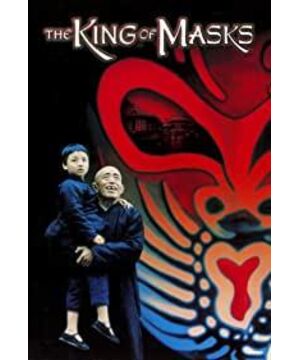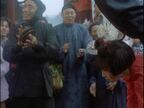When watching the film, I have always had a question: when we realize that others value us only because of one of our instrumental characteristics or skills, once we lose this skill, we will be treated badly, what will we think? Obviously, it's survival of the fittest, and that's what happens to everyone. Just as the dog baby was attracted by the face-changing king because he dressed up as a boy, after the truth was revealed, the grandfather became the boss, and the grandfather and grandson became the master and servant, and everything changed. But even so, Gouwa still has a warm feeling for the face-changing king: hard work and no complaints, just hope that he will not be driven away. Maybe this is the innocent nature of the child. She has experienced seven times of being sold like livestock and met a boss who treats her like a person. Even if it is only for a few days, even if it is just because of lies, she is satisfied. In addition, about the shaping of the image of the boss of the living Guanyin Liang, it can be said that it is a bit strange. First, Boss Liang likes the face-changing king's face-changing stunt, and just like that, is he willing to take the risk of giving up his lifelong interests to save him? Even if this is not the case, it is because of the dog's filial piety, but in that era of war and turmoil, is a person's feelings or even life really that important? And this also involves their own interests, which means giving up comfort. How many people are willing at that time? Is it not precisely because of the weakness and inferiority of the people that Mr. Lu Xun's bloody accusations come? However, even if there are hundreds of people out of a thousand people, it seems that there is always one person who can be sober. Moreover, Boss Liang is also a person in the rivers and lakes. The face-changing Wang respects him as a brother named Pao, "Brother Pao has a loyal and righteous hall", and the dog is a filial piety (thinking in perspective, who can resist a child's life to save someone's call for help), and may have his role More or less influence, presumably the living Bodhisattva will not die without saving. In this way, I think this role is a more reasonable existence in the contradiction. The whole film is a comedy and literary film depicting the bottom-level artists, and it can be said to be extremely detailed. The part before being imprisoned is a true portrayal of life; after being imprisoned and getting out of prison, it is more like a wish and hope, hoping that those craftsmen living at the bottom of society can at least have incense to continue. From this point of view, the whole work is more like a hope for a happy ending for the underlying art. Of course, this cannot deny its real social significance and social analysis value. It is a masterpiece of literature and art in terms of emotion and reason.
View more about The King of Masks reviews








